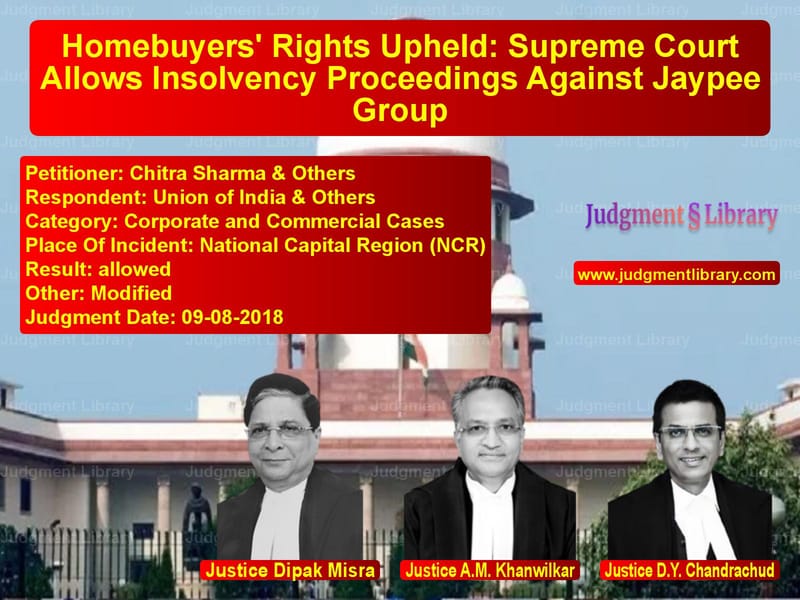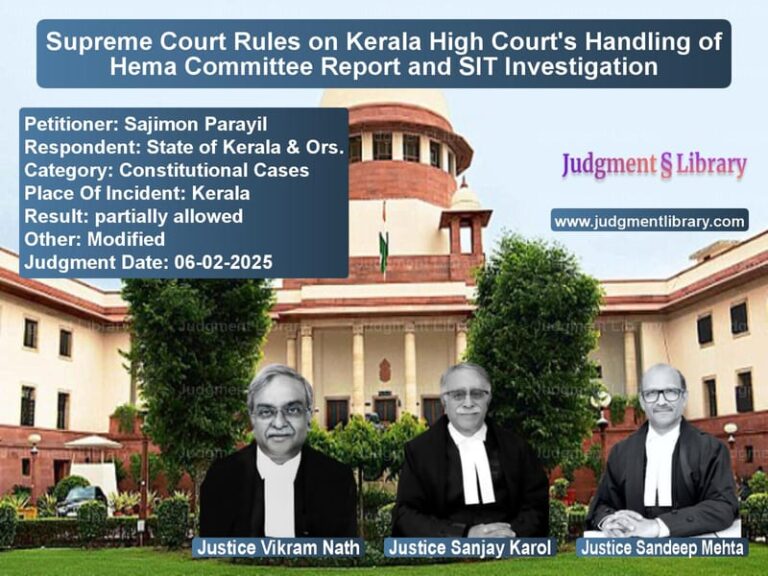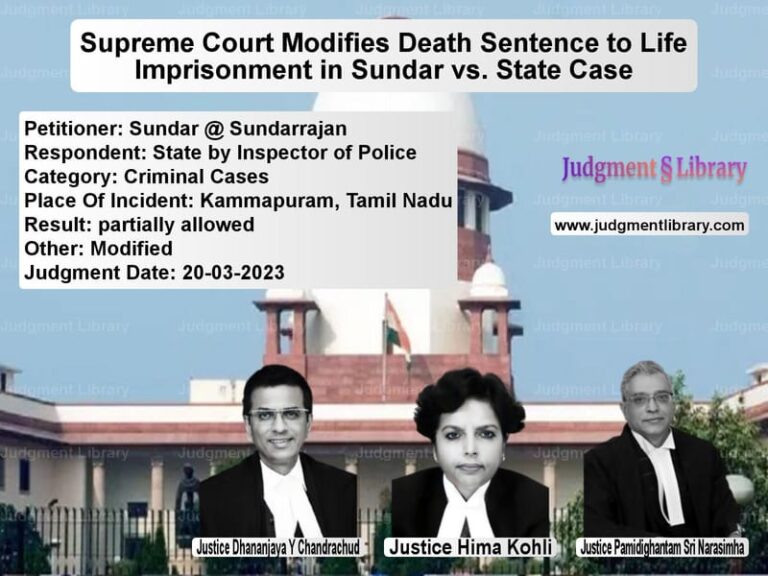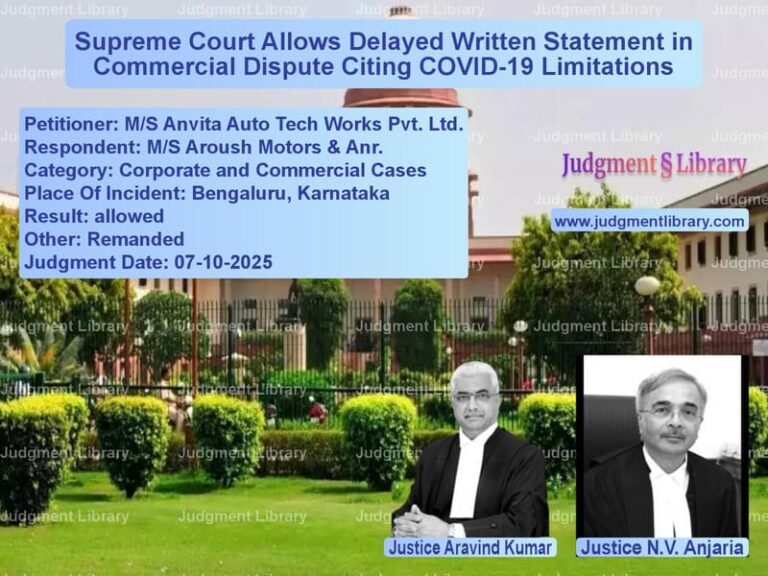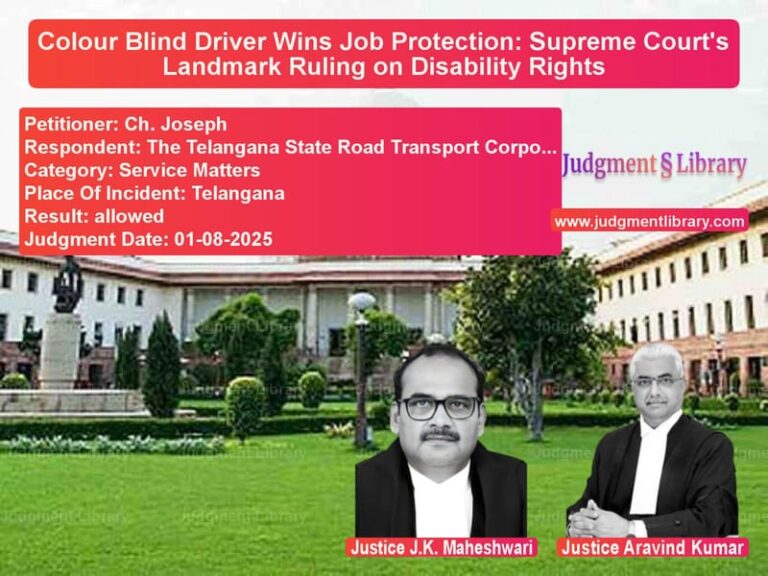Homebuyers’ Rights Upheld: Supreme Court Allows Insolvency Proceedings Against Jaypee Group
The Supreme Court of India, in the landmark case of Chitra Sharma & Others v. Union of India & Others, delivered a significant judgment protecting the rights of homebuyers affected by the insolvency of Jaypee Infratech Limited (JIL). The verdict, delivered on August 9, 2018, by a bench comprising Chief Justice Dipak Misra, Justice A.M. Khanwilkar, and Justice D.Y. Chandrachud, upheld the decision to initiate Corporate Insolvency Resolution Process (CIRP) against Jaypee Infratech Limited and Jaiprakash Associates Limited (JAL).
Background of the Case
The case arose from multiple writ petitions filed by homebuyers who had invested in residential projects developed by JIL, a subsidiary of JAL. These projects, located in the National Capital Region (NCR), were significantly delayed, leaving thousands of homebuyers in financial distress. While these homebuyers had paid substantial amounts to JIL, the company defaulted on its loans, leading to insolvency proceedings initiated by IDBI Bank under the Insolvency and Bankruptcy Code, 2016 (IBC).
The homebuyers challenged the insolvency proceedings, arguing that they were excluded from the definition of ‘financial creditors’ under IBC. As a result, they had no representation in the Committee of Creditors (CoC) and could not safeguard their interests. The case also raised concerns about the fate of over 32,000 homebuyers who had invested their life savings in Jaypee projects.
Petitioners’ (Homebuyers’) Arguments
The homebuyers, represented by various associations, presented the following key arguments:
- IBC Discriminates Against Homebuyers: The homebuyers were not classified as financial creditors under IBC, depriving them of a say in the insolvency process.
- Moratorium Prevents Legal Remedies: The moratorium imposed under Section 14 of IBC barred homebuyers from seeking relief through consumer forums and civil courts.
- Refund and Compensation Demands: Many homebuyers had taken loans to purchase flats that were never delivered. They sought refunds or alternative relief to recover their investments.
- Fraud and Financial Mismanagement: The petitioners sought a forensic audit of JIL and JAL, alleging diversion of funds and financial mismanagement.
- Government Intervention Needed: The homebuyers urged the government to amend IBC to recognize them as financial creditors, ensuring their participation in insolvency proceedings.
Respondents’ (Government and Banks) Arguments
The Union of India, IDBI Bank, and other financial institutions defended the insolvency proceedings with the following arguments:
- IBC Framework is Effective: The insolvency process is designed to maximize the value of assets and ensure a structured resolution.
- Homebuyers’ Interests Considered: Although homebuyers were not initially classified as financial creditors, the IRP was directed to protect their rights.
- Economic Stability: Allowing an exemption for homebuyers from the IBC framework would disrupt the financial sector and set a negative precedent.
- Existing Consumer Protection Laws: Homebuyers could still seek relief under the Real Estate (Regulation and Development) Act, 2016 (RERA) and the Consumer Protection Act, 1986.
Supreme Court’s Observations
After carefully reviewing the arguments, the Supreme Court made the following crucial observations:
- Homebuyers as Financial Creditors: The Court recognized that homebuyers have a legitimate financial stake in real estate projects. Their investments resemble financial borrowings and should be treated as financial debt under IBC.
- Amendments to IBC: The Court acknowledged the Insolvency and Bankruptcy (Amendment) Ordinance, 2018, which classified homebuyers as financial creditors.
- Continuing Construction: The Court emphasized that liquidation of JIL was not in the best interest of homebuyers and directed authorities to explore alternatives to ensure project completion.
- Judicial Oversight: The Court asserted its role in ensuring justice for homebuyers, especially in cases of large-scale financial fraud and mismanagement.
- Insolvency Proceedings Against JAL: The Court permitted RBI to initiate insolvency proceedings against JAL, given its financial irregularities.
Final Judgment
The Supreme Court issued the following directions:
- Fresh CIRP Initiation: The insolvency resolution process for JIL was revived with a 180-day timeline for resolution.
- Committee of Creditors Reconstitution: Homebuyers were included as financial creditors with voting rights in the CoC.
- Invitation for Fresh Bids: The IRP was directed to invite fresh bids for resolving JIL’s insolvency, ensuring that multiple entities could participate in the resolution process.
- Exclusion of Promoters: Jaypee Group and its promoters were barred from participating in the bidding process due to their financial misconduct.
- Refund Process: The Court refrained from ordering immediate refunds but directed that all financial creditors, including homebuyers, be treated equitably.
Impact of the Judgment
The ruling had far-reaching implications:
- Homebuyers’ Rights Strengthened: The judgment led to the formal recognition of homebuyers as financial creditors under IBC.
- Accountability for Real Estate Developers: The ruling reinforced the need for financial discipline among developers, ensuring that homebuyers’ interests are safeguarded.
- Judicial Activism in Consumer Rights: The Supreme Court’s intervention showcased the judiciary’s role in protecting consumer rights in large-scale insolvency cases.
- Policy Reforms: The case prompted amendments in IBC, ensuring that homebuyers were no longer sidelined in insolvency proceedings.
Conclusion
The Supreme Court’s verdict in Chitra Sharma & Others v. Union of India & Others was a landmark decision in protecting homebuyers’ rights in insolvency cases. By recognizing homebuyers as financial creditors, the Court ensured their active participation in the resolution process. This ruling set a precedent for similar cases involving real estate insolvencies and reinforced the importance of consumer rights in financial legislation. With homebuyers now having a voice in insolvency proceedings, this judgment stands as a milestone in India’s legal and real estate landscape.
Petitioner Name: Chitra Sharma & Others.Respondent Name: Union of India & Others.Judgment By: Justice Dipak Misra, Justice A.M. Khanwilkar, Justice D.Y. Chandrachud.Place Of Incident: National Capital Region (NCR).Judgment Date: 09-08-2018.
Don’t miss out on the full details! Download the complete judgment in PDF format below and gain valuable insights instantly!
Download Judgment: Chitra Sharma & Othe vs Union of India & Oth Supreme Court of India Judgment Dated 09-08-2018.pdf
Direct Downlaod Judgment: Direct downlaod this Judgment
See all petitions in Bankruptcy and Insolvency
See all petitions in Corporate Governance
See all petitions in Consumer Rights
See all petitions in Judgment by Dipak Misra
See all petitions in Judgment by A M Khanwilkar
See all petitions in Judgment by Dhananjaya Y Chandrachud
See all petitions in allowed
See all petitions in Modified
See all petitions in supreme court of India judgments August 2018
See all petitions in 2018 judgments
See all posts in Corporate and Commercial Cases Category
See all allowed petitions in Corporate and Commercial Cases Category
See all Dismissed petitions in Corporate and Commercial Cases Category
See all partially allowed petitions in Corporate and Commercial Cases Category

